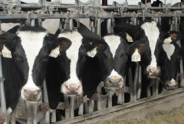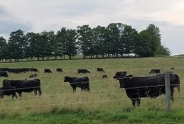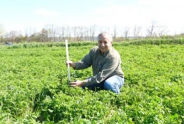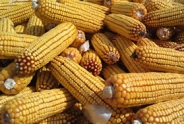Winter Crop Meeting 2022 - A Virtual Weekly Meeting Series
Event Details
Date
January 14, 2022
January 21, 2022
January 28, 2022
February 4, 2022
March 23, 2022
Time
1:00 - 2:00pm
Location
Virtual / Zoom Video Conference
Cost
Full Winter Crop Meeting Series Access : $15.00
(addl attendee $15.00 ea.)
Host
South Central New York Dairy & Field CropsJanice Degni
(607) 391-2672
email Janice Degni
2022 Winter Crop Meeting - Virtual Weekly Series
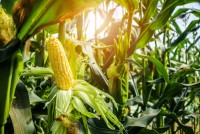
January 14 - Methane's Role in Global Warming & Current and Future Opportunities to Decrease Enteric Methane
Dr. Bob Howarth, The David R. Atkinson Professor of Ecology and Environmental Biology & Current and Future Opportunities to Decrease Enteric Methane Dr. Thomas R. Overton, Professor and Chair of Animal Science-CU and Director PRO-DAIRY Program
Professor Howarth will describe methane as an agent of global warming, discussing its importance relative to carbon dioxide, asking if it matters whether the emission source is from agriculture or the oil & gas industry, and explaining why a 20-year time frame for comparing methane with carbon dioxide is now part of New York State law, embedded in the Climate Leadership & Community Protection Act of 2019. Professor Overton will discuss current strategies and future opportunities to decrease enteric methane in ruminants. This presentation provides an update and assessment of the current state of greenhouse gases in our atmosphere and their impact on changing global climate. Understand the role of agriculture to contribute to lowering emissions.
January 21- Corn Silage: 2021 Hybrid Trials and Key Considerations for 2022
Joseph Lawrence, Dairy Forage Systems Specialist, PRODAIRY Program
The Corn Silage Hybrid Evaluation Program is a source of independent information on hybrid performance and a platform for conducting other work to better understand how to optimize the production of corn silage. Joe oversees the project with tremendous support from Margaret Smith, Tom Overton and their teams. The results of the 2021 trials will be discussed with emphasis on how the growing condition's influenced both crop yield and forage quality. Forage quality was analyzed and utilized to predict how each hybrid would perform in a dairy feeding program using the Cornell CNCPS nutrition model to predict milk yield from cows fed each of the hybrid entries. The session will also review key considerations for getting the most out of your forage program in 2022. New updates include what we are learning about corn N use efficiency from the hybrid trials and considerations of high input costs from the view of forage shrink losses which cost more when crops cost more to grow.
January 28 - The Value of Manure told with Five Stories
Dr. Quirine Ketterings, Cornell Spear Nutrient Management Program
and Kirsten Workman, Nutrient Management Specialist with PRODAIRY.
This presentation will share research results that answer the following questions: What is the fertilizer replacement value of manure? How does injection of manure in alfalfa impact the crop? Can shallow incorporation be as effective in conserving N as deeper incorporation? Can no-till planting be compatible with manure injection? What is the carry over benefit of manure application?
Feb 4 - Carbon Markets - A Realistic Outlook
Jenifer Wightman, Senior Extension Associate, specializes in greenhouse gas emission and mitigation potentials for Agricultural and Forest Ecosystems in the School of Integrative Plant Science Soil and Crop Sciences Section, CALS, Cornell
The agricultural literature abounds with articles about the opportunities that carbon credits may someday offer. Indigo Ag explains that carbon credits are created based on carbon dioxide you draw down into your soil and GHG emissions you reduce above the soil. This presentation will provide an overview of carbon-credits for farm and forest owners. As well as include different opportunities and the considerations involved before signing a carbon-credit contract.
March 23 - Net 0 and Sustainability
Dr. Quirine Ketterings, Cornell Spear Nutrient Management Program and Olivia Godber, Post Doctoral Research Associate
The U.S. Dairy Net Zero Initiative (NZI) launched in 2020 is an industry-wide effort towards achieving the U.S. dairy's 2050 environmental stewardship goals including carbon neutrality. The Nutrient Management Spear Program (NMSP) at Cornell University is involved in two major projects that aim to help the dairy industry reach its goals: (1) the Dairy Soil and Water Regeneration Project (under leadership of DMI and SHI); and (2) the Dairy Sustainability Key Performance Indicators Project. The first project focuses on assessment of soil health practices on greenhouse gas emissions and forage crop production. The second project includes whole farm nutrient mass balance, carbon footprint, and biodiversity assessments as key components of environmental stewardship. In this presentation, Quirine Ketterings and Olivia Godber will give updates on both projects and share initial results.
Upcoming Events
2026 Dairy Day
January 13, 2026 : Dairy Day - Hamilton
Hamilton, NY
Lunch included
January 14, 2026 : Dairy Day - Ballston Spa
Ballston Spa, NY
Lunch included
I Thought I Was Covered for That! - Farm Insurance Webinar Series
January 13, 2026
January 20, 2026
January 27, 2026
February 3, 2026
February 10, 2026
Free Webinar Series
2026 Corn & Soybean Day
January 20, 2026 : Corn & Soybean Day - Hamilton
Hamilton, NY
Lunch included. 2.75 DEC Credits available
January 21, 2026 : Corn & Soybean Day - Ballston Spa
Ballston Spa, NY
Lunch included. 2.75 DEC Credits available
Announcements
Statewide Field Crop Pathology Needs Assessment Survey
Your input is wanted for identifying priorities!Sign Up for Our Weekly E-Newsletter
We send out a bi-weekly e-newsletter that has announcements, upcoming programs, and opportunities for you! Registration is quick, easy, and free. Click here to sign up today!Farmers Can Join MeatSuite For Free!
MeatSuite.com is a free resource provided by Cornell University where NY meat farmers can create a farm profile and list their bulk (wholes, halves, quarters) and bundled (i.e. Grilling Bundle) meat products.Why should farmers join?
1. It's free and easy!
2. Connect with more local customers. In the past year the MeatSuite.com farm directory had 8,300 visits from New York consumers. Farm profiles get as many as 25 views per month from potential local customers. We also spotlight MeatSuite farms on social media and bring attention and purchases to farms through highlights and giveaways.
How do I join?
Farmers can visit https://www.meatsuite.com/farmers/ to create a free farm profile. You must list at least one product for your farm's profile to go live. You'll also have access to Cornell's free Meat Price Calculator, a helpful tool for pricing your meat to make a profit.
While you're on MeatSuite, check out the "Creating Consumer-Friendly Bulk Meats" publication on the log-in page. It has tips on how to create bulk meat products that are easier for first-time buyers to say "yes" to.
If you have any questions as you create your farm profile or products, we're here to help! Please email Matt LeRoux at mnl28@cornell.edu.

